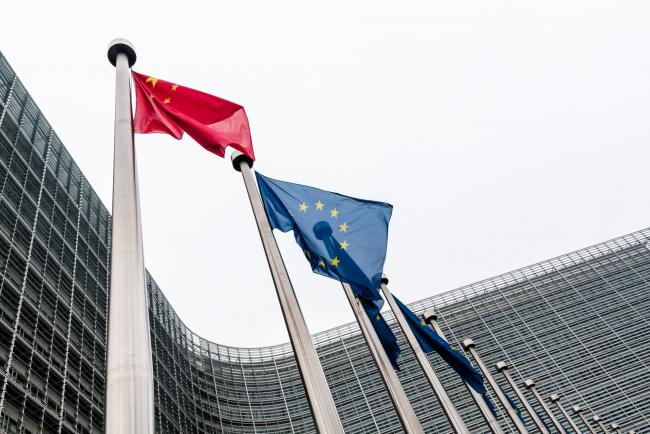(Bloomberg) -- In a rare display of geopolitical muscle, the European Union is rolling out a series of measures aimed at redefining its relationship with China while also trying to rein in Beijing’s trade ambitions on the continent.
The European Commission on Wednesday will unveil a set of proposals to bolster local industries in fighting back against companies that receive aid from foreign governments. The plan could ban these non-EU firms from making acquisitions, or force them to divest assets, and allow the commission to impose fines.
Europe, caught between an increasingly aggressive China and an America in retreat from the world stage, is seeking to transform itself from being a relative bystander to carving out its place in the global order. The latest move by the bloc comes just after the EU launched a novel way to use tariffs to curb China’s “Belt and Road” infrastructure plan and just before new legislation on screening foreign-direct investment on national security grounds comes into effect.
The EU’s internal market “can be open to certain abuse where state-owned enterprises can subsidize companies in order to compete with European companies in an unfair way,” Phil Hogan, the bloc’s trade chief, said during an online event on Tuesday. “We now see the need to have a level playing field,” he added in reference to China.
The 27-nation EU has been under pressure to better protect its local industries and repatriate supply chains after the global pandemic caused the steepest recession in almost a century and spurred a rout in equity prices.
A post-pandemic rescue plan presented by German Chancellor Angela Merkel and French President Emmanuel Macron last month aims to fortify Europe internally, but also contains measures to equip it to better face outside threats.
The 750 billion-euro ($845 billion) coronavirus recovery package would seek to help those countries most affected by the global pandemic and includes a proposal that would allow the EU to take equity stakes in companies.
Governments are particularly alarmed at the prospect of European companies being bought by firms with unlimited credit lines or being forced out of business because rivals can afford to sell below cost.
A draft of the commission’s proposal seen by Bloomberg sees “an increasing number of incidences in which foreign subsidies appear to have facilitated the acquisition of EU undertakings,” pointing to aluminum, steel, semiconductors, shipbuilding and the car sector, as “prone to foreign subsidies which provide their beneficiaries with a competitive advantage.”
‘Redressive Payments’
The EU’s executive arm suggests action against firms already active in Europe that use subsidies to compete unfairly with local rivals. Authorities could start investigations into cases that involved more than 200,000 euros in foreign state funding over three years. Companies could be forced to make “redressive payments” to European states, repay the subsidy to their home state or sell off units or assets to resolve the concerns.
“The main objectives of China’s subsidy measures are to encourage environmental protection and energy conservation, support technological research, development and innovation, and promote optimization of corporate structure,” China’s mission to the EU said in a statement, when asked about the plans, adding that its actions are compliant with World Trade Organization rules.
In a separate move this week, the EU announced an unprecedented tariff decision that will allow the bloc to take aim at alleged market-distorting aid granted by a country to exporters located in another state. To date, such European duties have focused only on subsidies provided by the country where the exporters are based.
Meanwhile, the Chinese government allowed a landmark WTO dispute -- aimed at forcing the EU to recognize it as a market economy in trade investigations -- to lapse on June 15. China had spent four years fighting for market-economy status, a designation that would give it stronger footing with commercial partners while also curtailing their ability to retaliate over trade disputes.
The case was initially brought in 2016 and China lost an interim ruling on the matter last year. By ending the dispute China now provides the EU with greater legal certainty to combat low-price Chinese exports with artificially high tariffs.
The latest EU front represents a dramatic departure for the bloc, which usually has little influence when it comes to matters of foreign policy since that power rests with member nations. But because these issues involve trade, which is an area where the EU does hold sway, it has opened a path for Brussels to exert its clout.
“We can often be taken for granted in our internal market for the fact that we have a very open market to third countries,” Hogan said.
©2020 Bloomberg L.P.

